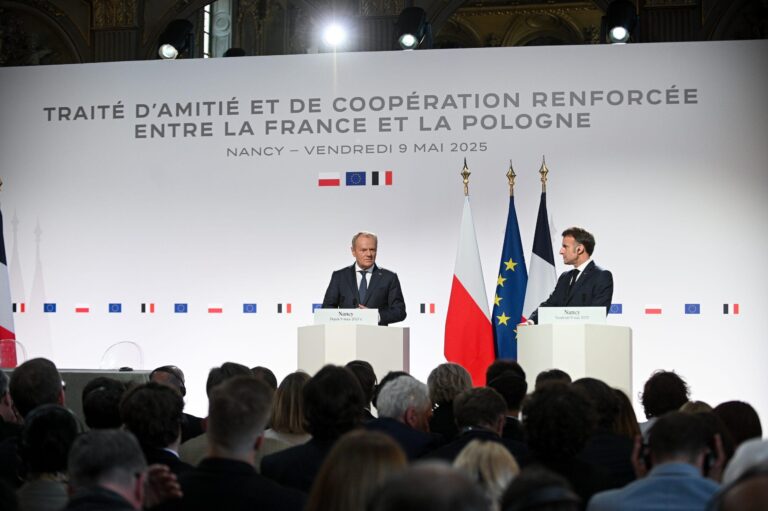Treaty of Nancy: France and Poland Unite for a Safer Europe
In a significant geopolitical development, France and Poland have solidified their partnership with the signing of the Treaty of Nancy, a landmark agreement aimed at enhancing security across Europe. This treaty comes at a time of increasing concerns over regional stability and emerging threats, marking a crucial step towards fostering cooperation between two of the continent’s key players. Leaders from both nations expressed their commitment to a unified approach in addressing security challenges, with a focus on military collaboration, intelligence sharing, and mutual defense strategies. As Europe faces an evolving security landscape, this alliance underscores a renewed determination to create a safer, more resilient continent. The implications of this treaty are far-reaching, potentially reshaping alliances and strategies for years to come.
Strengthening Franco-Polish Security Ties through the Treaty of Nancy
The recent signing of the Treaty of Nancy marks a pivotal moment in strengthening the security cooperation between France and Poland. This bilateral agreement not only reinforces military commitments but also aims to enhance collaborative efforts in intelligence sharing and counter-terrorism. Key components of the treaty include:
- Joint Military Exercises: Regular exercises designed to improve operational readiness and interoperability between the armed forces.
- Cybersecurity Initiatives: Enhanced frameworks for safeguarding critical infrastructure against emerging cyber threats.
- Defense Industry Collaboration: Promoting partnerships between defense manufacturers to bolster technological advancements.
As Europe faces a diverse array of security challenges, the Franco-Polish alliance seeks to address these concerns by creating a robust framework for mutual defense. The treaty’s overarching goals encompass not only military enhancement but also deepened diplomatic ties, particularly in the context of European Union stability. The table below summarizes the main objectives outlined in the Treaty of Nancy:
| Objective | Description |
|---|---|
| Military Cooperation | Increase joint training and operational synergy. |
| Intelligence Sharing | Facilitate information exchange on security threats. |
| Resource Allocation | Joint funding initiatives for defense projects. |
Strategic Implications for Europe’s Defense Landscape
The recent signing of the Treaty of Nancy marks a significant turning point in Europe’s defense strategy. By formalizing their alliance, France and Poland are positioning themselves as key defenders against emerging threats, particularly in light of rising tensions in Eastern Europe. This collaboration can lead to several strategic outcomes:
- Enhanced Military Collaboration: Joint exercises and shared intelligence initiatives will bolster the military capabilities of both nations.
- Increased Security for Eastern Flank: Poland’s geographical location will serve as a crucial buffer against potential aggressors in the east.
- Strengthened Political Alliances: France’s efforts to unify EU military stance will gain momentum with Poland’s engagement.
This alliance may catalyze a ripple effect across Europe, prompting other nations to reevaluate their defense strategies in a rapidly changing geopolitical landscape. The collaboration is expected to include:
| Key Areas of Focus | Expected Outcomes |
|---|---|
| Cyber Defense | Shared resources to combat digital threats. |
| Defensive Infrastructure | Modernization of border security and logistics. |
| Joint R&D | Innovative technologies for future warfare. |
As the landscape evolves, this treaty symbolizes not just a bilateral partnership but a commitment to collective security within the EU framework. The broader implications will likely prompt discussions around NATO’s role and Europe’s readiness to tackle multifaceted threats.
Economic Collaborations to Bolster Regional Stability
In a landmark agreement forged under the Treaty of Nancy, France and Poland are aligning their economic strengths to foster regional stability in Europe. This collaboration aims to not only strengthen bilateral trade relations but also enhance security through economic interdependence. Both nations are focusing on sectors that promise mutual growth and resilience, including:
- Energy Security: Joint investments in renewable energy initiatives.
- Defense Collaboration: Shared technology and resources to bolster military readiness.
- Infrastructure Development: Coordinated projects to improve transportation and logistics networks.
Moreover, this partnership is expected to set a precedent for future alliances within the region. By creating a framework for economic cooperation, France and Poland are paving the way for enhanced diplomatic dialogue and collective approaches to regional challenges. A projected increase in trade volume has been outlined in the following table, showcasing anticipated growth across key sectors:
| Sector | Current Trade Volume (Million Euros) | Projected Growth (2025) |
|---|---|---|
| Energy | 300 | 500 |
| Defense | 150 | 250 |
| Transport | 100 | 180 |
Future Pathways for Enhanced Bilateral Cooperation and Joint Initiatives
The Treaty of Nancy sets the stage for a transformative partnership between France and Poland, emphasizing collaborative efforts across various sectors to bolster security and stability in Europe. The nations aim to implement a series of strategic initiatives, including:
- Joint Military Exercises: To enhance defense readiness and interoperability of forces.
- Intelligence Sharing Programs: Facilitating real-time information exchange to tackle emerging threats.
- Cybersecurity Alliances: Strengthening both countries’ defenses against cyber threats through shared technology and resources.
Moreover, economic cooperation is set to flourish under the treaty, with an emphasis on sustainable development and energy security. Key aspects include:
- Cross-Border Investment Initiatives: Encouraging businesses in both nations to partner in innovative projects.
- Joint Research and Development: Focusing on clean energy technologies and environmental protection.
- Cultural Exchange Programs: Promoting mutual understanding and collaboration in education and tourism.
In Conclusion
In conclusion, the Treaty of Nancy marks a significant step toward enhanced security and cooperation between France and Poland, reinforcing their shared commitment to a safer and more united Europe. As both nations navigate the complexities of modern geopolitical challenges, this partnership could serve as a model for future collaborations across the continent. With their combined resources and strategic vision, France and Poland are poised to address pressing security concerns while promoting stability and prosperity. The implications of this treaty extend beyond bilateral relations; they resonate throughout Europe, inviting other nations to consider the benefits of solidarity in pursuit of collective security. The international community will be closely watching how this alliance unfolds and shapes the future of European cooperation in a rapidly changing world.




